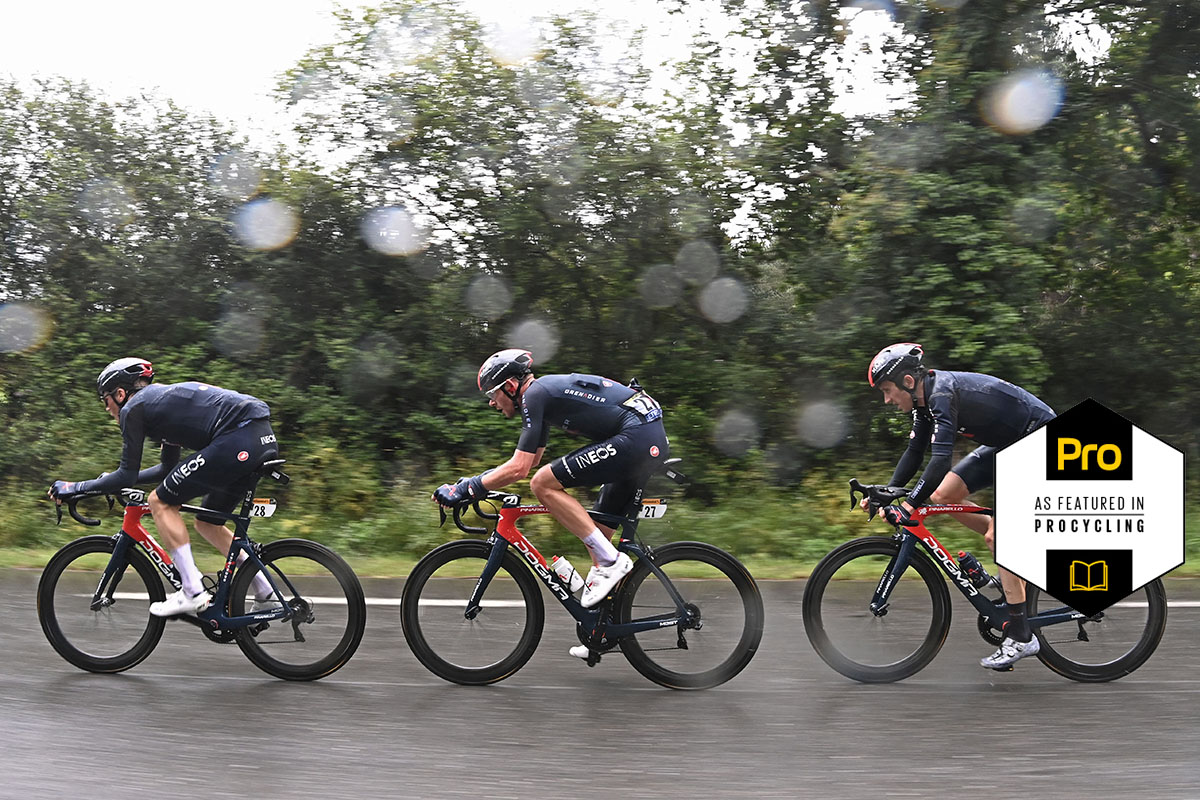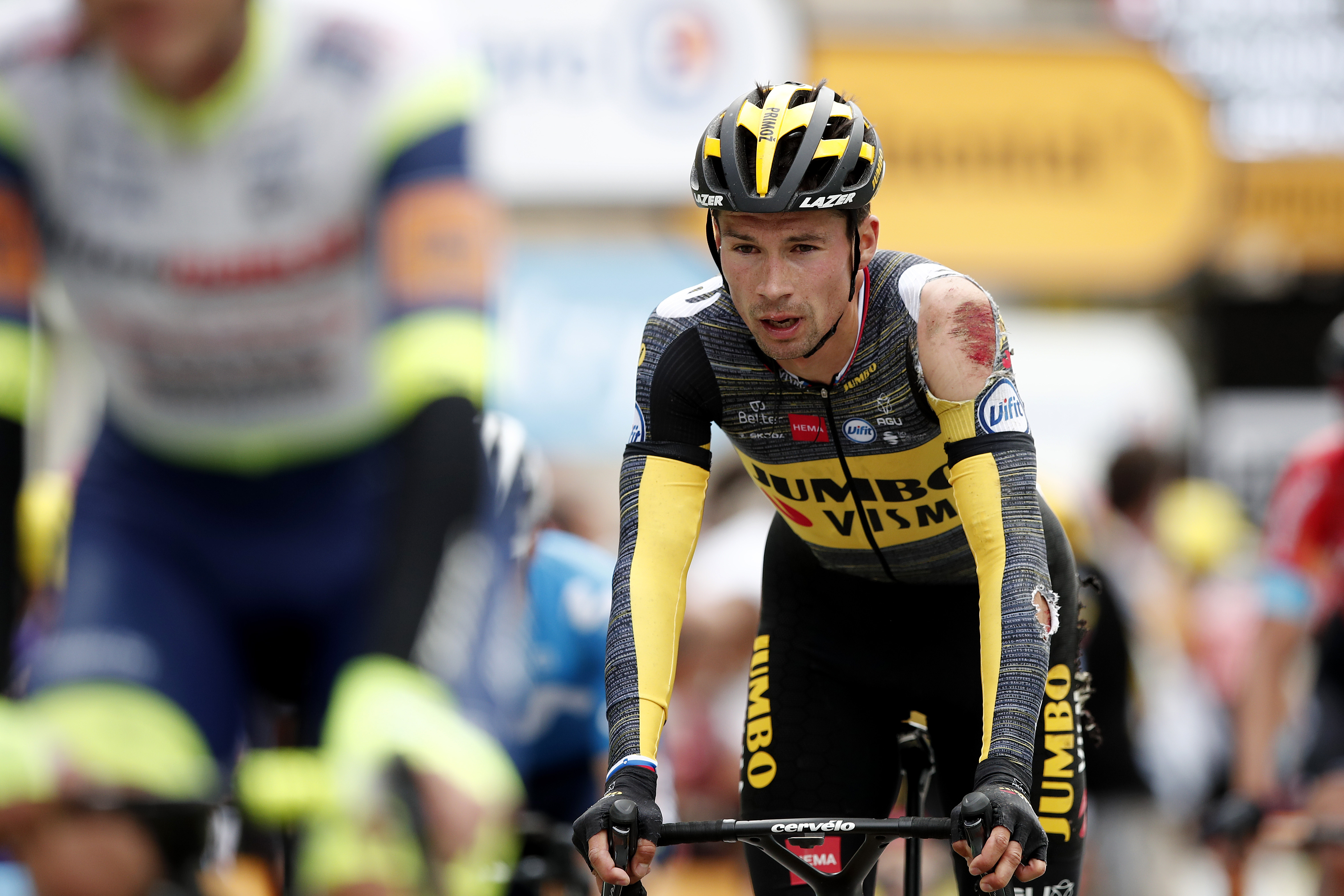Tour de France stage 3: Ineos and Jumbo count the cost of injuries
The two strongest teams in the Tour de France are weakened by multiple crashes

The most innocuous looking days of the Tour de France have long proved to be the most treacherous. The saying among the peloton is always that the Tour is the hardest race of the year because you can’t stop concentrating for even a second. There’s so much stress in the bunch, that anything can happen. And true to form, the Tour hadn’t even rolled out of Brittany after the grand départ and Ineos Grenadiers and Jumbo-Visma will both be wondering quite how their riders have taken such a beating in less than three days of racing, after another day of chaos, carnage and mayhem to Pontivy on stage 3.
For Ineos, the team who have been the defining squad of the Tour over the last decade, winning seven yellow jerseys since 2012, they’ve have endured more time losses and crashes than any other time in their 11-year history in the Tour at this early point in the race, with Geraint Thomas’s crash on stage 3 potentially leaving management considering a strategic rethink. For Jumbo, almost all of their riders have hit the deck in the opening three days, but it is injuries to team leader Primož Roglič and road captain Robert Gesink, the latter who was due to be a major support for his leader in the mountains and was forced to abandon the race, that will have provided the biggest cause to panic.
To win in a Grand Tour, riders always need to have luck on their side. That’s not to say that Grand Tour winners are lucky, but cycling is a sport where any multitude of outside factors can catch riders out, and in the worst case end their race. Thomas knows the importance of luck more than many, having seen three of his Grand Tours end with him in a heap on the roadside and on a plane home early - most recently, last year’s Giro where a rogue bottle rolling across the road in the neutralised zone brought him down and then sent him home four days in. Indeed, again on stage 3, on a quiet stretch of road with 144km still to go, the Welshman hit the deck out of nowhere after a touch of wheels. You could hear the words ‘not again’ racing through his mind as he slumped on the ground and clutched his right shoulder in agony.
Roglič, like Thomas, is a rider who has seen more than one victory slip away thanks to crashes in what should be harmless places. His Critérium du Dauphiné challenge last summer ended early after a crash on a descent, while at Paris-Nice this spring, he lost the race lead on the final day after coming down twice during the race’s 92km final stage. And again on stage 3, as the peloton spread across the road just inside 10km to go to Pontivy with the finish line almost in sight, Roglič went flying to the ground taking down team-mate Jonas Vingegaard with him.
Jumbo-Visma was already a team of walking wounded before this. Tony Martin was the rider hit by a fan’s cardboard sign on stage 1, starting a ripple effect behind that brought down almost the entire Dutch team and half of the peloton. Martin, Wout van Aert, Mike Teunissen, Sepp Kuss and Roglič all needed treatment that evening. Gesink, meanwhile, was forced to abandon the race after the same crash that Thomas came down in.

In Roglič, the 2020 runner-up, Jumbo-Visma have one of the top two strongest riders in the Tour, the only rider who has shown he can equally match defending champion Tadej Pogačar this season. They have no plan B - winning yellow with Roglič is what the team came here to do. If Roglič is injured and below par, their hopes of winning disappear too.
Ineos, meanwhile, might not have one of the top two strongest riders, but they did have the strongest team on paper. Their six stage race wins so far this year is more than any other team, and if they are to beat Roglič or Pogačar to the title, their strength in depth is their biggest asset. But after three days that advantage has been destroyed.
The latest race content, interviews, features, reviews and expert buying guides, direct to your inbox!
2020 Giro winner Tao Geoghegan Hart lost 5:33 in the second major pile-up on stage 1, and after ceding more time on stages 2 and 3 now sits 12:17 back, out of the GC. Richie Porte, who finished third in Paris last year, was held up in the same crash as the young Briton on day 1, losing 2:16 that day, and now sits in 41st place, 3:34 back. Thomas dropped time to Pogačar and Roglič at Mûr-de-Bretagne on stage 2, before the effects of his crash a day later in which he dislocated his shoulder had come into view. Only 2019 Giro winner Richard Carapaz remains unscathed, sitting in third place overall and having lost merely 31 seconds he’s now surely the Ineos Grenadiers’ de facto team leader.
Thomas and Roglič remounted their bikes to finish stage 3, with Thomas conceding just 26 seconds and Roglič limiting his deficit to 1:21 (Roglic’s time gap, if it’s at all noteworthy, is the same as the time Pogačar lost in the crosswinds on stage 7 last year). They now sit in 18th and 20th positions on GC respectively. Their Tour challenges are still salvageable but the ramifications of their injuries could linger and cause problems in the days and weeks to come, particularly with the first of two individual time trials on stage 5.
You aren’t lucky if you win the Tour de France, but as Jumbo-Visma and Ineos will testify after the first three days this year, having luck on your side helps if you want to win.
Sophie Hurcom is Procycling's deputy editor.
Procycling magazine: the best writing and photography from inside the world's toughest sport. Pick up your copy now in all good newsagents and supermarkets, or get a Procycling subscription.
Sophie Hurcom is Procycling’s deputy editor. She joined the magazine in 2017, after working at Cycling Weekly where she started on work experience before becoming a sub editor, and then news and features writer. Prior to that, she graduated from City University London with a Masters degree in magazine journalism. Sophie has since reported from races all over the world, including multiple Tours de France, where she was thrown in at the deep end by making her race debut in 2014 on the stage that Chris Froome crashed out on the Roubaix cobbles.